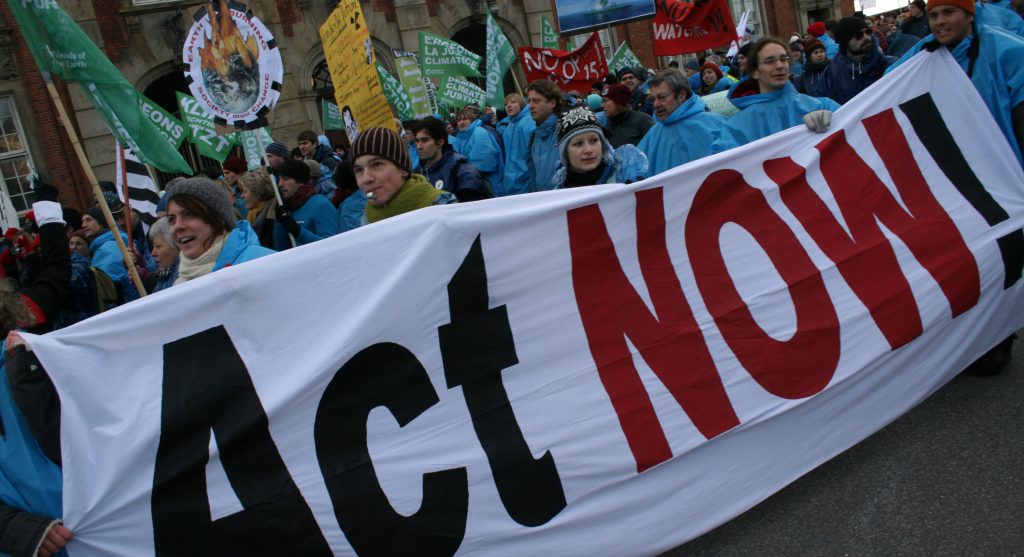Brussels, 30 November 2007 – Friends of the Earth Europe has demanded strong leadership by European governments at next week’s United Nations climate conference in Bali, Indonesia from 3-14 December. In Bali, governments will begin to negotiate the international obligations on climate change for after 2012, when the first commitment period of the Kyoto Protocol expires.
Sonja Meister, Climate Campaigner at Friends of the Earth Europe, said:
“These United Nations climate talks in Bali are crucial to pave a clear path for the next commitment period of the international climate change regime.
“The EU has a global leadership role on climate change, but even its targets aren’t ambitious enough to save us from climate catastrophe. Europe has to go further and encourage other industrialised countries to agree to deeper, mandatory targets, to be met through real action at home.
“And the EU must hold its hands up and accept its fair share of the responsibility for financing the adaptation and mitigation costs of climate change in developing countries.”
In March 2007 EU Heads of State agreed to cut their greenhouse gas emission by 20 percent unilaterally; and by 30 percent if other industrialised countries are willing to do the same, and if developing countries take on adequate responsibilities. But recent discussions within the UN based on the latest scientific findings indicate that these targets do not even go far enough to fulfil the EU’s own commitment to limit global temperature increase to 2 degrees Celsius. [1]
Friends of the Earth Europe is urging the EU to step up its commitment in Bali, and publicly agree to unconditionally reduce its emissions by at least 30 percent by 2020, through domestic action alone – this target must not be met by offsetting EU emissions by buying cheap carbon credits from elsewhere. On top of this, huge additional obligations will be needed from the EU and other industrialised countries to support low carbon development in the South.
In Bali, the EU should lead governments into agreeing a roadmap which ensures:
Climate justice
- The legally binding burden sharing of emissions reductions must be based on historical responsibility for climate change and capacity to act.
- The North must recognise its historical responsibility and must finance adaptation and mitigation in the South in addition to its domestic reduction obligations.
- Developed countries must finance the decarbonisation of developing countries’ economies, through direct investment and transfer of green technologies.
Meaningful targets
- The industrialised world must commit to greenhouse gas emission reduction pathways that ensure the scientifically needed reductions in global emissions. Emissions from industrialised countries must fall by at least 40 percent by 2020 and by 90 percent by 2050.
- Industrialised countries have to take strong domestic action first instead of offsetting their emissions with cheap carbon credits from elsewhere: Industrialised countries must reduce their emissions by at least 30 percent domestically by 2020.
A comprehensive regime
- The next commitment period must be based on the architecture of the Kyoto Protocol and must start no later than January 2013, to avoid a gap between commitment periods.
- The new climate regime must have strong procedures to enforce its provisions and rules in order to avoid legal uncertainty. There should be independent verification that emissions reductions and financing obligations of industrialised countries are met, with stringent penalties for non-compliance.
- The new climate regime must address the massive contribution of deforestation to greenhouse gas emissions.[2] A range of policy measures and financial measures must be developed to guarantee that forests are protected, while securing the rights of indigenous people and local communities.
- International air and marine transportation must be included in the next commitment period of the Kyoto Protocol. Full account must be taken of the global warming effect of emissions at high altitude.[3]
***
NOTES
[1] The overarching goal of the UNFCCC is the stabilisation of greenhouse gas concentrations at a level that prevents dangerous intervention with the climate system. The scientific community suggests that this requires the global average temperature increase to stay below 2 degrees over pre-industrial levels. Even 2 degrees is by no means a “safe” level but will already have severe consequences.
The 2 degrees Celsius target is acknowledged by the European Commission, in for example http://europa.eu/press_room/presspacks/energy/iasummarysec7.pdf
The IPCC reports show that the stabilisation level of 450ppm (parts of carbon dioxide per million) that the EU takes into account for this target will not give high confidence in limiting warming to 2 degrees Celsius (only about a 50:50 probability).
The range of emission reduction targets for industrialised countries currently discussed in the UNFCCC working group AWG (Ad Hoc Working Group on Further Commitments for Annex I Parties under the Kyoto Protocol) ranges from 25-40 percent by 2020 from 1990 levels. Even this may still lead to an increase in global temperatures of 2 – 2.4 degrees.
In this context, the current EU targets to reduce greenhouse gas emissions are inadequate. Therefore the EU must advocate emission reductions on the ambitious end of this range, and higher.
[2] One fifth of global man-made emissions come from land-use chance and deforestation. Source: SBSTA. Report on a workshop on reducing emissions from deforestation in developing countries, 30.8.-1.9.2006, FCCC/SBSTA/2006/10).
[3] Emissions from both international air and marine transportation are fast-growing but yet not covered by the Kyoto Protocol. International aviation that the EU accounts for has increased by 86 percent between 1990 and 2004. Source: European Environment Agency, TERM 2006: indicators tracking transport and environment in the European Union.






